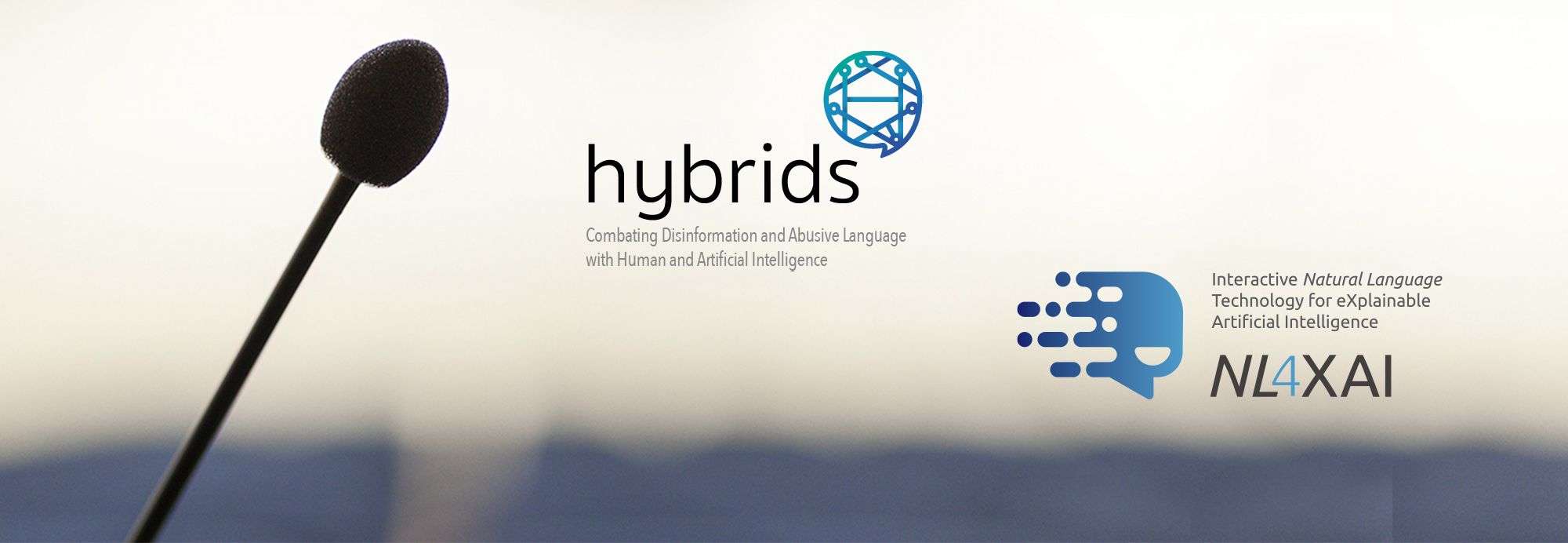
HYBRIDS: Hybrid Intelligence to monitor, promote and analyse transformations in good democracy practices
Combining machine and human intelligence to tackle disinformation online
Fake news, disinformation and hate speech online are pervasive and exacerbating societal tensions. Amidst growing concern that this harmful rhetoric is inciting violence and driving extremism, a global strategy to counter this digital phenomenon is more important than ever. In this context, the Marie Skłodowska-Curie Actions project HYBRIDS is working to provide researchers with the knowledge and tools they need to tackle disinformation. Specifically, it will integrate the structured knowledge provided by social and human sciences into natural language processing tools and deep learning algorithms. By developing new hybrid intelligence systems, HYBRIDS will combine machine and human intelligence to overcome the shortcomings of existing artificial intelligence methods.
Objectives
False rumors, fake news or hate speech against vulnerable minorities through social media are becoming one of the main threats against democracies. A global strategy against disinformation is crucial as open democratic societies rely on free citizens with the ability to access verifiable information so that they can build their own opinions on different political issues. The main scientific objective of HYBRIDS is to provide researchers with the knowledge necessary to design strategies and tools to response to disinformation on the basis of a deep analysis of public discourse. There have been interesting advances in the automatic detection of disinformation by making use of natural language processing and new artificial intelligence techniques in the specific field of machine and deep learning.
However, this is a very complex task that requires a high degree of natural language understanding, inference and reasoning. To improve the strategies to deal with disinformation, HYBRIDS will integrate the structured knowledge provided by social and human sciences into natural language processing tools and deep learning algorithms, so as to develop new hybrid intelligence systems. The concept of Hybrid Intelligence consists of combining machine and human intelligence to overcome the shortcomings of existing artificial intelligence methods.
Even though hybrid systems are likely to become more and more decisive in the immediate future, there are very few experts who can design and develop such systems. This is mainly due to the multidisciplinary nature of the hybrid strategy and the difficulty of finding researchers with full training in traditionally separate disciplines such as computer engineering, social sciences or linguistics. We believe it is time to launch a DN with the necessary requirements to train researchers in hybrid methodologies for their application in social studies with an impact on the sustainability of good democratic practices in Europe.
Project
/research/projects/intelixencia-hibrida-para-supervisar-promover-e-analizar-as-transformacions-das-boas-practicas-democraticas
<h3>Combining machine and human intelligence to tackle disinformation online</h3><p>Fake news, disinformation and hate speech online are pervasive and exacerbating societal tensions. Amidst growing concern that this harmful rhetoric is inciting violence and driving extremism, a global strategy to counter this digital phenomenon is more important than ever. In this context, the Marie Skłodowska-Curie Actions project HYBRIDS is working to provide researchers with the knowledge and tools they need to tackle disinformation. Specifically, it will integrate the structured knowledge provided by social and human sciences into natural language processing tools and deep learning algorithms. By developing new hybrid intelligence systems, HYBRIDS will combine machine and human intelligence to overcome the shortcomings of existing artificial intelligence methods.</p><p>False rumors, fake news or hate speech against vulnerable minorities through social media are becoming one of the main threats against democracies. A global strategy against disinformation is crucial as open democratic societies rely on free citizens with the ability to access verifiable information so that they can build their own opinions on different political issues. The main scientific objective of HYBRIDS is to provide researchers with the knowledge necessary to design strategies and tools to response to disinformation on the basis of a deep analysis of public discourse. There have been interesting advances in the automatic detection of disinformation by making use of natural language processing and new artificial intelligence techniques in the specific field of machine and deep learning. </p><p>However, this is a very complex task that requires a high degree of natural language understanding, inference and reasoning. To improve the strategies to deal with disinformation, HYBRIDS will integrate the structured knowledge provided by social and human sciences into natural language processing tools and deep learning algorithms, so as to develop new hybrid intelligence systems. The concept of Hybrid Intelligence consists of combining machine and human intelligence to overcome the shortcomings of existing artificial intelligence methods. </p><p>Even though hybrid systems are likely to become more and more decisive in the immediate future, there are very few experts who can design and develop such systems. This is mainly due to the multidisciplinary nature of the hybrid strategy and the difficulty of finding researchers with full training in traditionally separate disciplines such as computer engineering, social sciences or linguistics. We believe it is time to launch a DN with the necessary requirements to train researchers in hybrid methodologies for their application in social studies with an impact on the sustainability of good democratic practices in Europe.</p> - 101073351 - Pablo Gamallo Otero - Marcos Garcia González, José María Alonso Moral
projects_en



